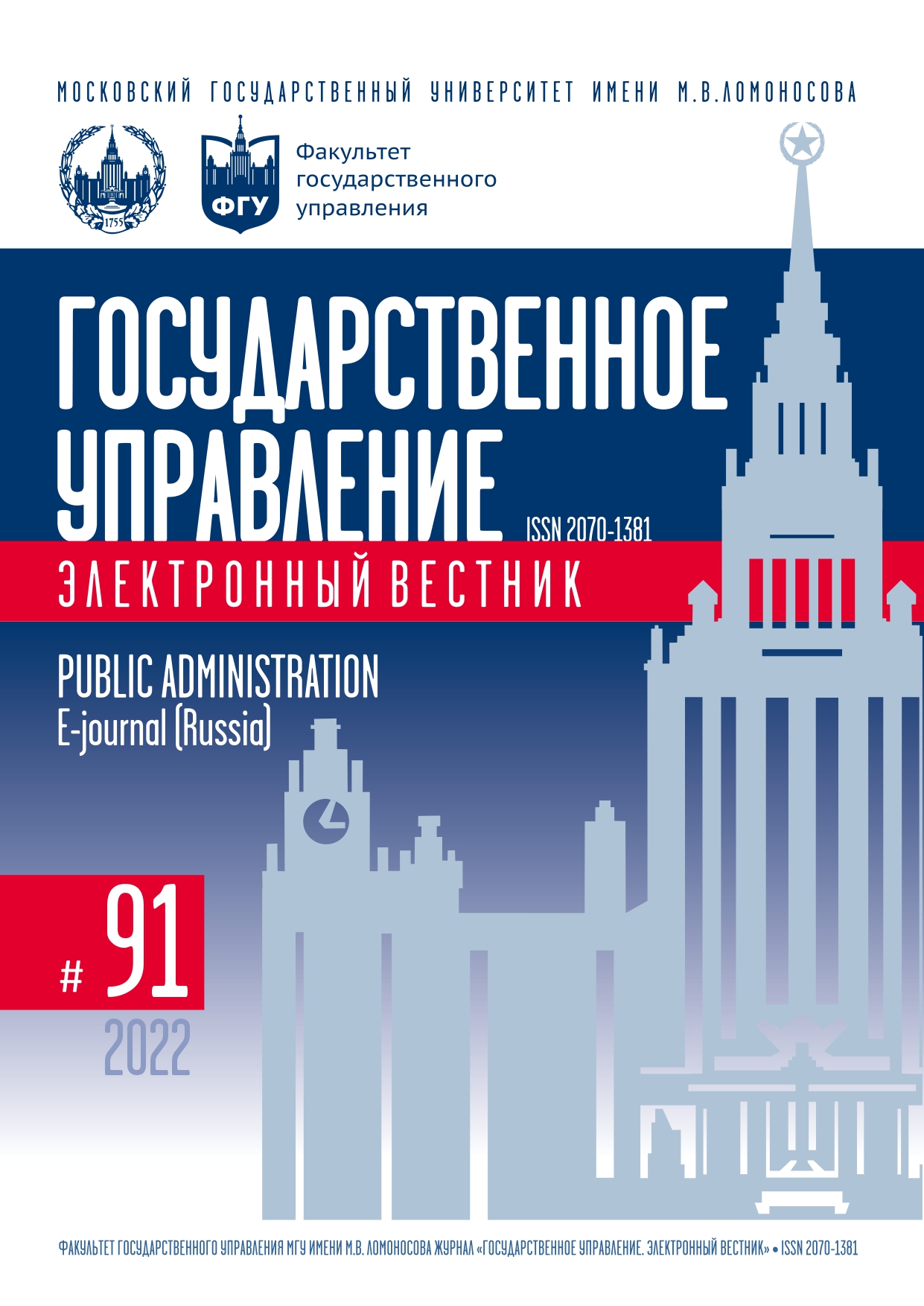Role of Soft Power Technologies in Activities of UN Women
Keywords:
Soft power, soft power technologies, public diplomacy, UN, UN system, UN Women, women’s political leadership, women in politics, gender issueAbstract
The article deals with the main soft power technologies in the activities of the entity of the General Assembly of the United Nations known as UN Women. The main communication strategies aimed at promoting the ideas of gender equality and the empowerment of women are considered. The activities of the institution within the educational, value and rating tracks are studied in detail. The attention of the researchers is drawn to the way in which UN Women responds to new challenges, forming an agenda on gender issues that affects almost all actors in the international space, to the methods and channels of spreading the value orientations of the institution. The article provides a comprehensive analysis of the organization’s activities over the entire history of its existence, to determine the main mechanisms for disseminating ideas of gender equality and the empowerment of women. The authors come to a conclusion that the use of soft power strategies and technologies is the main element of UN Women’s influence on the opinion of the world community on gender issues. The application of these technologies allows not only increasing the recognition of the structure, but also boosting its expert potential in gender issues. Due to the successful application of soft power strategies and technologies, the organization legitimizes its activities through the universal recognition and acceptance of the promoted values and thus indirectly exerts pressure on political leaders of participating countries in order to increase the importance of gender inequality issues on the national agenda. Thanks to soft power technologies, UN Women is one of the most significant elements of the international agenda in gender issues.
References
Калинина А.Ю. Усиление участия женщин в обеспечении устойчивого мира, согласно программе ООН-Женщины «мир и безопасность» // Общественные науки в современном мире: политология, социология, философия, история: Сборник статей по материалам XII–XIII международной научно-практической конференции. М.: «Интернаука», 2018. С. 37–40.
Наумов А.О. «Мягкая сила», «цветные революции» и технологии смены политических режимов в начале XXI века. М.: АРГАМАК-МЕДИА, 2016.
Паршин П.Б. Мягкая сила в лабиринте дискуссий. М.: МГИМО-Университет, 2020.
Сантальа Гонзалез К. ООН-Женщины в мире и безопасности: мирные процессы // Научные труды Северо-Западного института управления РАНХиГС. 2018. Т. 9. № 2 (34). С. 214–222.
Шведова Н.А. Гендерное равенство в меняющемся мире: «Нам нужны большие смелые шаги...» // Женщина в российском обществе. 2021. № 2. С. 90–106. DOI: 10.21064/WinRS.2021.2.7
Шведова Н.А. Отмечая юбилей: вопросы гендерного равенства в приоритетах ООН // Женщина в российском обществе. 2020. № 3. С. 16–29. DOI: 10.21064/WinRS.2020.3.2
Soft power, мягкая сила, мягкая власть. Междисциплинарный анализ / сост. и ред. Е.Г. Борисова. М.: Флинта, 2020.
Soft power: теория, ресурсы, дискурс / Под ред. О.Ф. Русаковой. Екатеринбург: Издательский Дом «Дискурс-Пи», 2015.
Bloch Y. UN Women – eine Bilanz acht Jahre nach der Gründung der UN-Frauenorganisation // Fitschen T., Brühl T., Rathgeber T., Hüfner K., Bloch Y., Volger H. (hrsg.) Herausforderungen für die gegenwärtige deutsche UN-Politik. 14. Potsdamer UNO-Konferenz am 30. Juni 2018. Potsdam: Universitätsverlag Potsdam, 2019. S. 97–107. DOI: https://doi.org/10.25932/publishup-43151
Bloch Y. UN-Women. Ein neues Kapitel für Frauen in den Vereinten Nationen. Baden-Baden: Nomos Verlagsgesellschaft, 2019.
Mlambo-Ngсuka P. Becoming UN Women. A Journey in Realizing Rights and Gaining Global Recognition // Gender and Diplomacy / ed. by J.A. Cassidy. London and New York: Routledge, 2017. P. 170–186.
Nye J. Soft Power // Foreign Policy. 1990. № 80. P. 153–171. DOI: https://doi.org/10.2307/1148580
Nye J. Soft Power: The Means to Success in World Politics. New York: Public Affairs, 2004.
Nye J. The Information Revolution and American Soft Power // Asia Pacific Review. 2002. Vol. 9. Is. 1. Р. 69–70. DOI: https://doi.org/10.1080/13439000220141596
Sandler J., Goetz A.M. Can the United Nations Deliver a Feminist Future? // Gender & Development. 2020. Vol. 28. Is. 2. P. 239–263. DOI: https://doi.org/10.1080/13552074.2020.1753432
Downloads
Published
Issue
Section
Categories
How to Cite
Most read articles by the same author(s)
- Alexander O. Naumov, Joseph Nye’s Concept of Soft Power in Foreign Scientific Discourse: Interpretation and Criticism2 , Public Administration. E-journal (Russia): No. 89 (2021)
Similar Articles
- Anastasiia G. Rebrikova , Women's Representation in Government Bodies of the Russian Federation in the Period from 1991 to 2023 , Public Administration. E-journal (Russia): No. 105 (2024)
- Alexandr O. Naumov, Marina V. Belousova, On the Issue of Sharp Power Technologies in the Modern World , Public Administration. E-journal (Russia): No. 98 (2023)
- Anastasiya A. Zhokhova, Problems of Developing Researches on Women’s Political Leadership: A Bibliometric Analysis , Public Administration. E-journal (Russia): No. 106 (2024)
- Chen Sili, Olga V. Mikhaylova, “Shine of Pearls”: Opportunities and Prospects for Women’s Participation in Socio-Political Life in Modern China , Public Administration. E-journal (Russia): No. 107 (2024)
- Anna М. Ryabinina, Technologies of Higher Education Internationalization in Modern Conditions , Public Administration. E-journal (Russia): No. 94 (2022)
- Alexander O. Naumov, Marina V. Belousova, Natalia V. Andreeva, From Propaganda to Public Diplomacy: The Emergence and Development of an Original Concept , Public Administration. E-journal (Russia): No. 96 (2023)
- Ilya A. Khabarov, In Vector of Political Self-Organization: Current Trends of Municipal Cross-Functional Interaction , Public Administration. E-journal (Russia): No. 92 (2022)
- Aleksandr O. Naumov, Yuriy Yu. Petrunin, Aleksandr A. Sagomonyan, Khrushchev — Franco — 1:1 (on the Football Fields of the Cold War) , Public Administration. E-journal (Russia): No. 108 (2025)
- Ruslan V. Nadtoka, Openness of State Data in the Field of Implementing Priority Directions of National Policy in the Subjects of the Russian Federation , Public Administration. E-journal (Russia): No. 86 (2021)
- Vyacheslav A. Nikonov, A New Member of BRICS — Egypt , Public Administration. E-journal (Russia): No. 105 (2024)
You may also start an advanced similarity search for this article.




